Features of the choice of plows for a mini-tractor
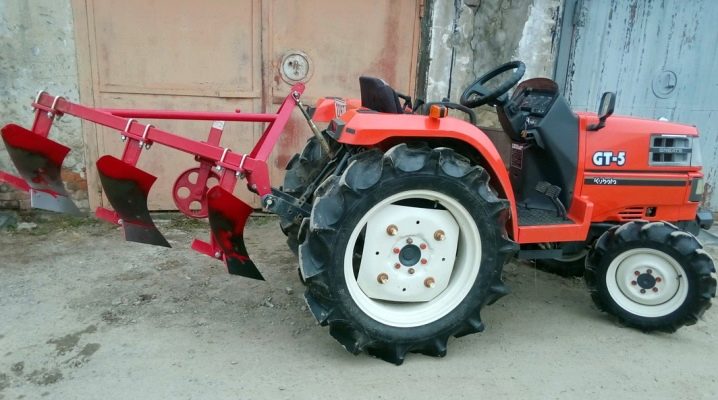
Performing agrotechnical work is a complex and time-consuming process that requires not only knowledge and experience, but also a large amount of physical strength. Without cultivating the fertile soil layer, it is impossible to grow a large crop of vegetables and fruits. Modern manufacturers produce a huge range of goods that greatly facilitate and speed up the work of farmers. One of these devices is a mini-tractor, complete with special attachments for cultivating the land, harvesting crops and snow, as well as for transporting goods.
The plow has been the most demanded equipment for many years. Modern equipment and innovative technologies allow manufacturers to produce several types of this device, which differ not only in price, but also in functionality.
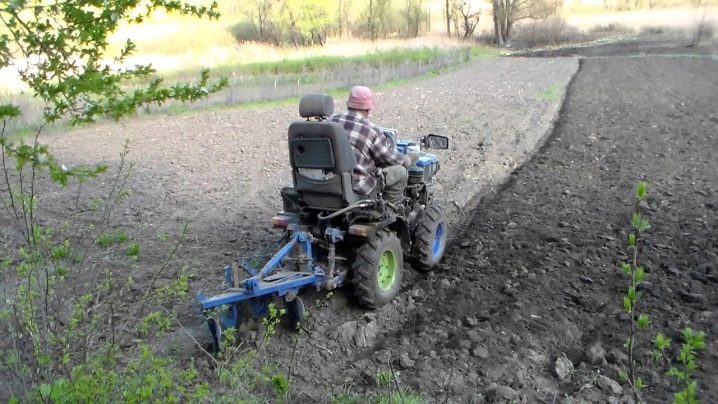
Peculiarities
The mini tractor plow is a versatile piece of equipment that is widely used by home owners and farmers. There are two types of devices - general and specialized. The plow includes the following elements:
- support part;
- ploughshare;
- rack;
- field board;
- feather.
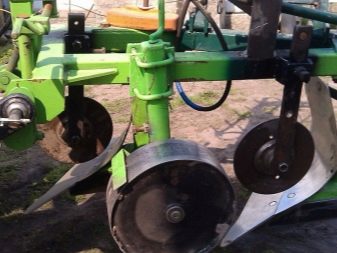
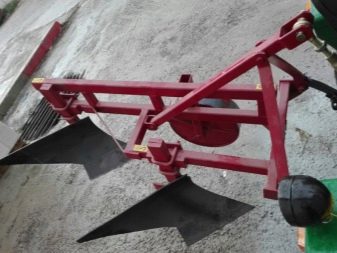
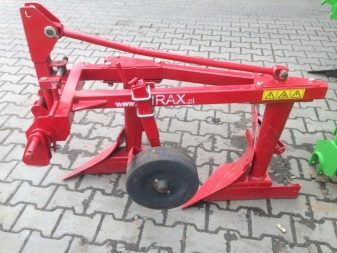
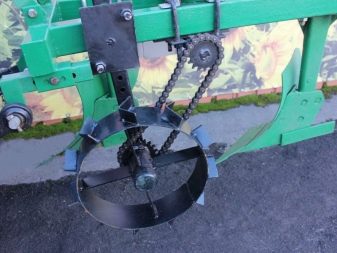
The main element of this device is an iron ploughshare made of alloy steel, the task of which is to turn over the top fertile layer of the earth. The working surface of the share not only lifts the ground, but also cuts the root system of weeds, and also promotes the placement of seeds at a great depth, where they will rot and will not germinate. Plowing not only allows you to make the soil loose, but also saturates it with oxygen. The ploughshare consists of a blade, heel and toe. There are three forms of a share, such as:
- screw;
- cylindrical;
- semi-cylindrical.
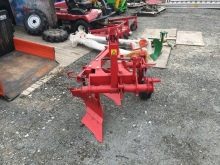
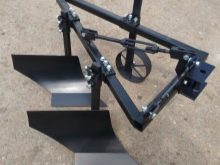
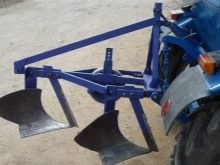
Important! The shape and size of the cutting working surface affects the efficiency and productivity of the device, as well as the depth of the furrow and the area of the treated area.
Plow types and their characteristics
Manufacturers produce several types of this equipment - rotary, disk and moldboard. Experienced farmers recommend paying attention to the two-body and three-body plows, which have two and three plowshares. The processing of small areas can be carried out using a single-body device, which consists of one share. By the method of plowing, the following types of equipment can be distinguished:
- furrowed;
- furless (even plowing);
- ridged.
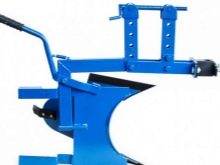
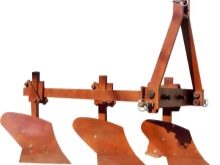
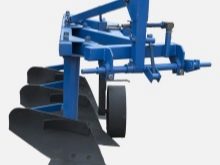
There are several types of plows by the type of fixation.
- Hinged - a tool that is fixed to the tractor using a single point hitch. The number of bodies corresponds to the type of tractor model. Advantages - low weight and simplicity of design, small turning radius. Disadvantages - inability to use equipment with a large number of bodies for a mini-tractor.
- Semi-mounted - equipment that uses not only special mounts, but also hinged wheels. For tractors with a pulling capacity of up to 3 tons, 6-furrow plows are suitable, and for mechanisms with a capacity of 5 tons, a 12-furrow attachment can be used. Advantages - high speed of work. The disadvantage is the presence of a large turning radius, the complexity of the design and the installation of auxiliary parts.
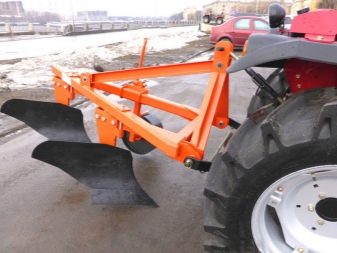
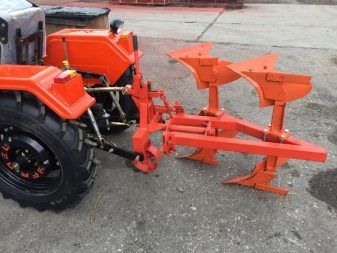
- Trailed - an unpopular device, for the movement of which only special wheels are used.Advantages - getting even and uniform plowing. Disadvantages - a large turning radius, the inability to use it on small personal plots.
- Horse - an outdated type of equipment that is used only in single farms. Advantages - the ability to cultivate fertile soil in hard-to-reach areas.
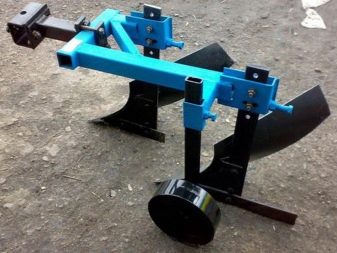
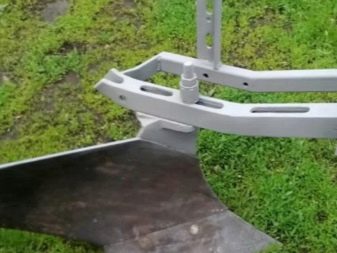
Important! Plows can also differ in functional purpose - for plowing, for working in reservoirs, for the formation of communication ditches.
Rotary
The rotor device is one of the latest developments of the manufacturers and consists of a movable shaft with several shares. This plow has a high speed and quality of soil cultivation. The main condition is the direction of the device strictly along a straight line. This design is indispensable for planting potatoes and other root crops. Manufacturers produce the following types of this equipment:
- drum - have rigid, springy or mixed pushers;
- bladed - consist of a movable disk, on which one or two pairs of blades are fixed;
- scapular - consist of fixed blades on a movable rotor;
- screw - have a working screw, which can be single-threaded or multi-threaded.
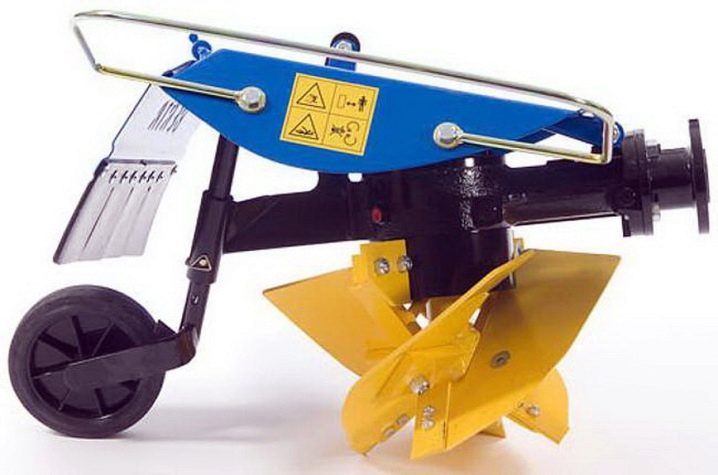
The main advantage is the impact on the soil from top to bottom. This feature allows you to work using the minimum tractive power of the tractor.
Plow-dump
Reversible (overhead) plow is made in the form of wedges, which are installed at a certain angle. After plowing, a curved dump with small pieces of soil is formed. The main feature is the implementation of the turn at the end of the furrow not of the tractor, but only of the plow. These mechanisms can have one or two cases. The furrow depth can be adjusted using the support wheel.
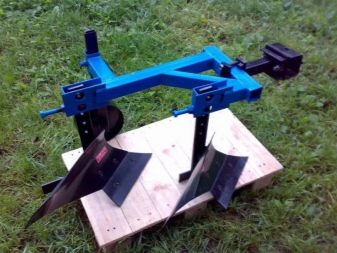
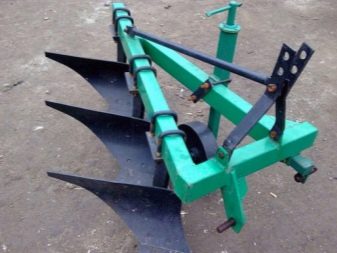
Disk
Disc attachments are shaped like a spherical disc that rotates on bearings. With the active, sharp working surface of the disc, the device easily cuts any kind of soil. Farmers use this plow to work on areas that have heavy, clayey and wet soil. The main feature of this model is the preservation of the integrity of the working surface of the cutting element in case of contact with a stone or metal object. The engine power on the tractor used must not be less than 18 hp. with. Particular attention should be paid to the universal plow, which has a manual pivot mechanism on a standard hitch. The chisel mechanism performs moldboard-free loosening of the soil. The plow design has three planes, such as:
- lower horizontal;
- lateral vertical;
- front blade.
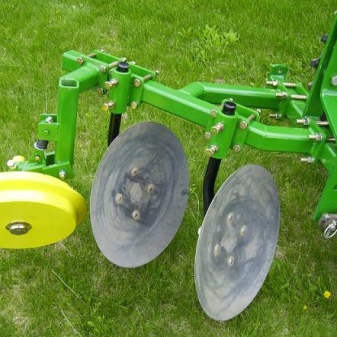
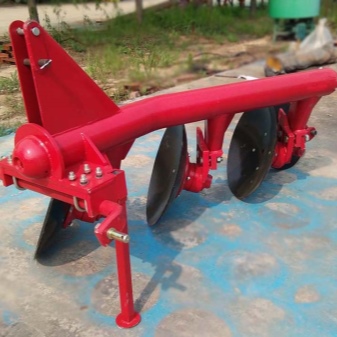
Selection Tips
The choice of the necessary equipment is influenced by the type of soil, the type and amount of work performed, as well as the power of the mechanical device. In specialized stores, you can see products from different manufacturers with a wide price range. In the ranking of sales of this group of goods, the leading positions are taken by products made in China, which have an affordable price and can be installed on any model of tractors.
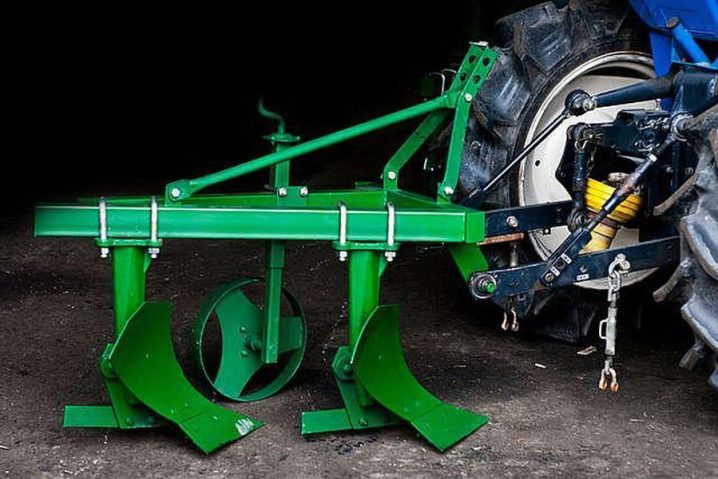
The choice of the number of cases depends on the required capacity of the device. Choosing a four-furrow plow, you need to take into account the power of the tractor. Mechanisms with low power levels are not capable of operating this model of equipment. For tractors with low power, double-body products are suitable. Single-body plows can be fixed even on a walk-behind tractor, and the area of the site should not exceed 15 acres. Experienced farmers advise to give preference to double-hull equipment, which has an optimal number of shares and dumps, as well as supplemented with sub-plows that help cut the sod and dense earth crust.
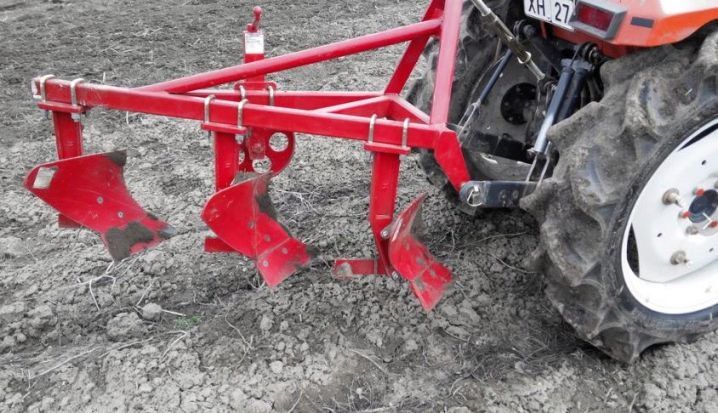
If it is impossible to purchase goods manufactured at industrial enterprises, professional farmers recommend making the product on their own or ordering it from experienced craftsmen. A self-made design will have the same functions and properties, but if necessary, it can be improved and supplemented with the necessary elements. If it is necessary not only to plow the land, but also to huddle the roots, you need to purchase a double-sided plow, which makes it possible to cut the weed in the aisles, form beds and, using reverse gear, fill the furrows. This device has the function of adjusting the working width. The disadvantage is the mandatory presence of professional skills in operating this equipment.
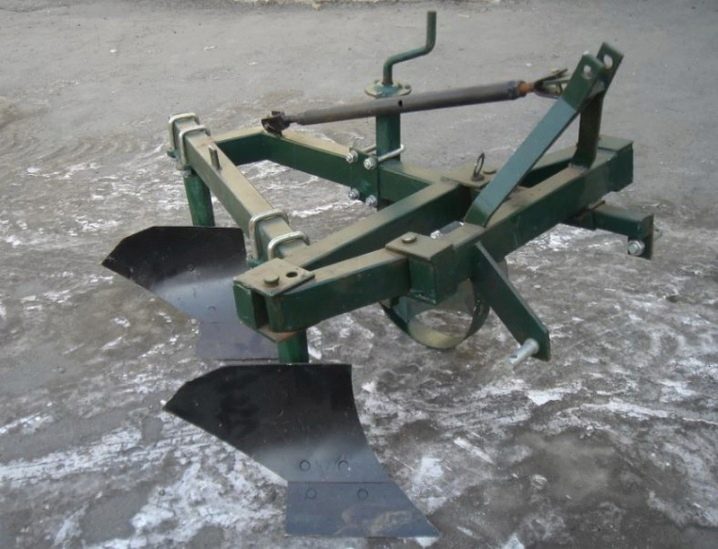
It is worth paying attention to the following signs of a poor-quality product:
- thin stand;
- short blade;
- small sheet thickness for the case;
- low quality steel.
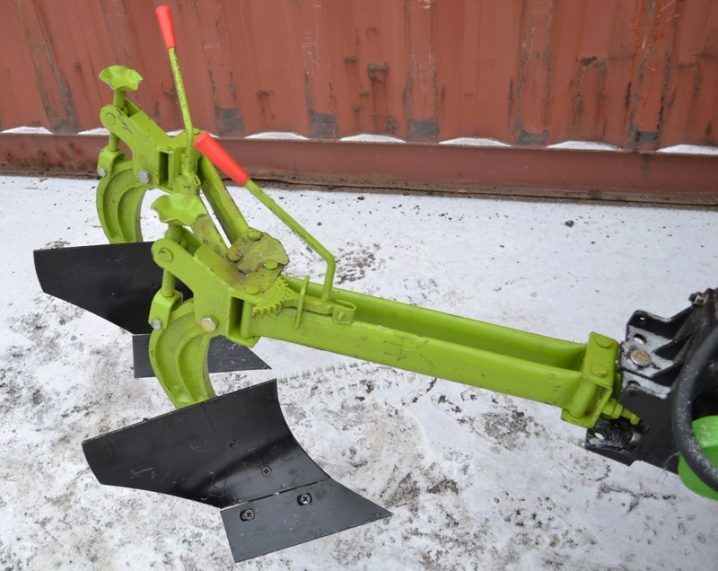
Subtleties of operation
The quality and speed of work performance depends not only on the choice of attachments, but also on the level of preparation of the device before work. Experienced plowmen recommend correctly adjusting and adjusting the installation, lubricating all moving elements and checking the reliability of fixation of each part. Among the basic rules for working with a plow, the following should be highlighted:
- weighting the device with iron discs that are attached to the frame - this trick will simplify work with heavy, clayey and dry soils;
- sharpening of the working blade is carried out only with the help of a sharpening stone;
- regular and timely cleaning of the ploughshare from soil and plant roots;
- daily lubrication of bearings;
- when working with a raised plow, you need to use special stands;
- after the last use, it is necessary to clean, wash and lubricate all structural parts;
- long-term storage should be carried out only in dry and ventilated rooms.
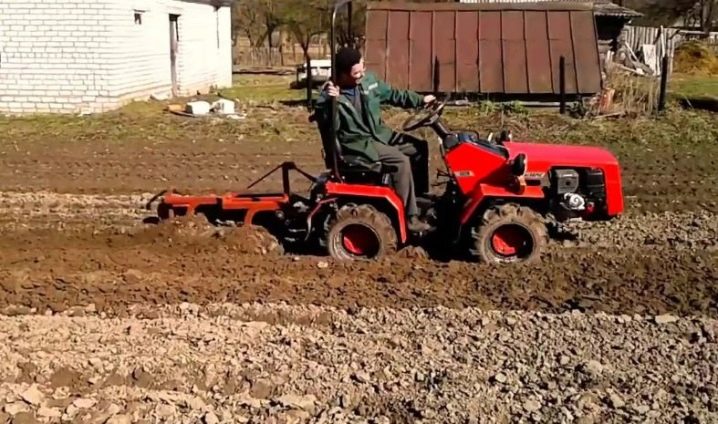
It is worth highlighting the following main stages of adjusting and setting up equipment:
- depth adjustment - carried out using the wheel adjustment bolt, which is located on the outside of the square tube; clockwise rotation of the workpiece increases the plowing depth, and counterclockwise movement decreases the furrow depth;
- furrow width adjustment - carried out by stretching the length of the control rod of the transverse shaft;
- leveling the sides - carried out by adjusting the height of the required bar;
- adjustment of the front and rear position of the frame is carried out by increasing or decreasing the length of the front bar of the body.
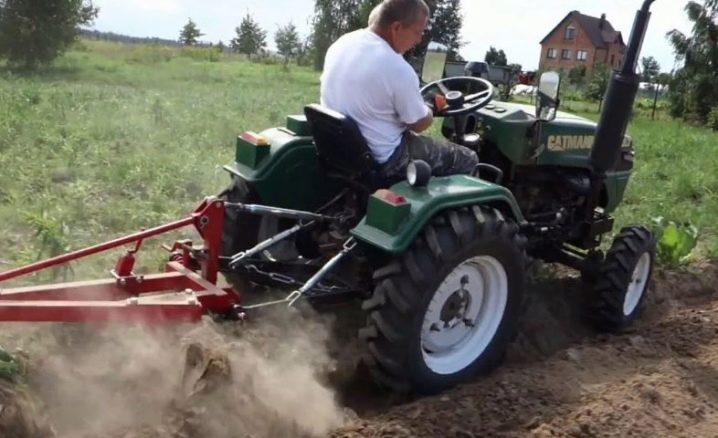
Adjustment of the plow should only be carried out on a flat and hard surface, while placing a wooden plank 180 mm high under the left wheels. For a mini-tractor with four-wheel drive, the height of the timber for the front wheel should be higher, and for mechanisms with rear-wheel drive, the size of the timber should be the same. The size of the wooden substrate was not chosen by chance and is associated with the shift of the center of gravity during operation to the right wheel. The left side will travel on loose and soft soil, which will lower the wheel a few centimeters. It is this feature (error) that affects the height of the bar.
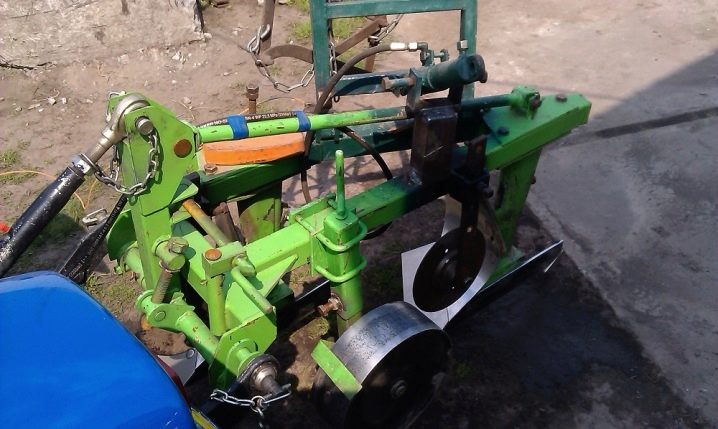
Important! To adjust the plow, it is necessary to set it in a strict vertical position relative to the ground level, taking into account the placed timber. This position will correspond to its location during plowing.
The adjustment of the first plow body is an important step in the adjustment process due to the loose fit of the right wheel to the soil, which significantly reduces the plowing width. It is worth completing the following configuration steps:
- adjustment of the distance between the inside of the right wheel and the extreme point of the share; the length of the indentation must be at least 10 percent of the width of capture of one body;
- checking the position of the share relative to the working surface; there should be no gaps or gaps between the sharp part of the plow and the ground;
- adjustment of the height of the field board, which should not be at least 2 centimeters above ground level;
- installation of the field board relative to the central axis of the tractor.
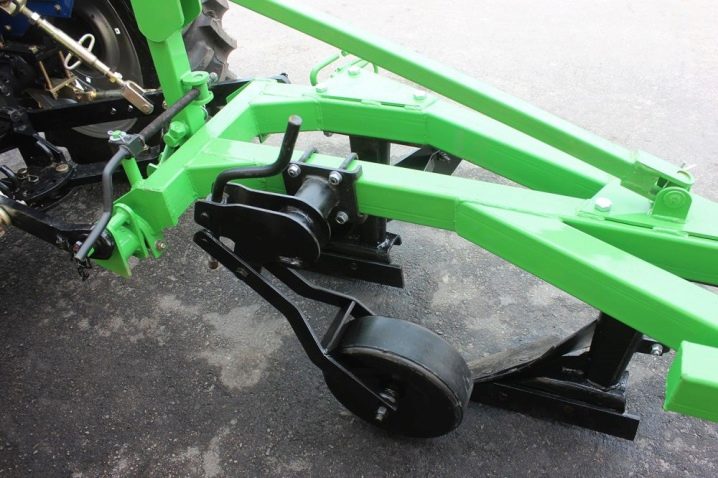
After purchasing the device, you must carefully study the manufacturer's instructions, which detail all the characteristics of the device, the types of possible breakdowns, the rules for their elimination, and describe all the subtleties of caring for the equipment. A plow for a mini-tractor has been an indispensable device for many decades, which is used by all land owners. The speed of the work, as well as its quality, depends on the correct choice of the device.
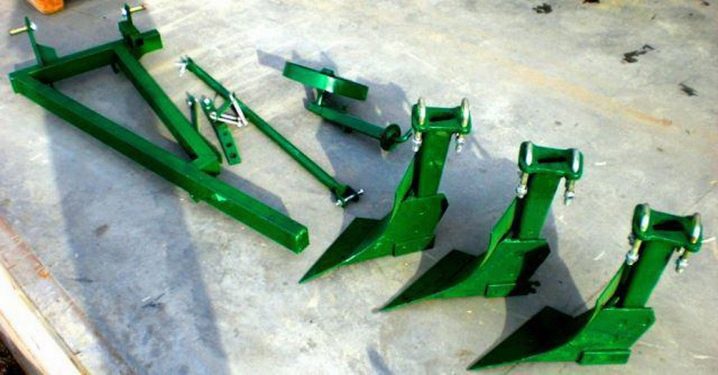
For information on how to properly adjust the plow for a mini tractor, see the next video.



































































The comment was sent successfully.